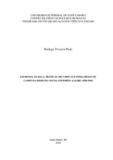| dc.creator | Pinto, Rodrigo Teixeira | |
| dc.date.accessioned | 2019-05-24T12:22:44Z | |
| dc.date.available | 2019-05-24T12:22:44Z | |
| dc.date.issued | 2018-12-11 | |
| dc.identifier.uri | http://repositorio.ufsm.br/handle/1/16637 | |
| dc.description.abstract | The passage from the 19th to the 20th century marks the late introduction of social medicine in Brazil in a gradual and slow way. This field of medicine characterized by its collective and preventive attributes and by the principles of eugenics and hygiene get more support between the medics in the first half of the 20th century who aims the implementation of a wide social medicine program. In Porto Alegre‟s context, although the number of medics, this field of medicine faced difficulties for its effectuation. Thus, taking as ground Michel Foucault‟s archegenealogical approach and its concepts (discursive practices, truth regime, discursive formation…) se sought to identify, delimit and analyze the intellectual production of physicians present in Porto Alegre, in its discursive aspect through scientific journals and published books in the social medicine field. Concomitantly with their intellectual production, we also identified and analyzed the implemented strategies in Porto Alegre in the delimited period, tracing the existing relations between social medicine knowledge (saber) and public health strategies present in the city between 1920 and 1945. Those objectives were guided by the hypothesis that the medic knowledge faced difficulties in Porto Alegre in its implementation as a hegemonic knowledge, in view of the presence of the positivist principles that the Partido Republicano Riograndense was driven. From the collected data throughout the research, we concluded that the decades of 1920 and 1930 were marked by a positivist truth regime where little or no space was given to social medicine and strategies of public health in Porto Alegrem while the last years of the decade of 1930 and the firsts of the next one mark a change of perspective starting with the reformulation of the Departamento Estadual de Saúde, where a medical social truth regime takes part, organizing new strategies, even though in a limited scope. | eng |
| dc.description.sponsorship | Coordenação de Aperfeiçoamento de Pessoal de Nível Superior - CAPES | por |
| dc.language | por | por |
| dc.publisher | Universidade Federal de Santa Maria | por |
| dc.rights | Attribution-NonCommercial-NoDerivatives 4.0 International | * |
| dc.rights.uri | http://creativecommons.org/licenses/by-nc-nd/4.0/ | * |
| dc.subject | Medicina social | por |
| dc.subject | Porto Alegre | por |
| dc.subject | Eugenia | por |
| dc.subject | Higienismo | por |
| dc.subject | Social medicine | eng |
| dc.subject | Eugenics | eng |
| dc.subject | Social Hygiene Movement | eng |
| dc.title | Em defesa da raça: práticas discursivas e estratégias no campo da medicina social em Porto Alegre (1920-1945) | por |
| dc.type | Dissertação | por |
| dc.description.resumo | A passagem do século XIX para o XX marca a introdução tardia da medicina social no Brasil, ainda que de forma lenta e gradual. Esse campo da medicina marcado pelo seu caráter coletivo e preventivo e embasado nos princípios da eugenia e do higienismo, ganha maior apoio entre os médicos na primeira metade do século XX que visam a implementação de um amplo programa médico-social. No contexto porto-alegrense, apesar da presença de um conjunto amplo de médicos, essa campo da medicina enfrentou dificuldades para sua efetivação. Dessa forma, tomando por base a abordagem arquegenealógica de Michel Foucault e seus conceitos (práticas discursivas, regime de verdade, formação discursiva...) se buscou identificar, delimitar e analisar a produção intelectual dos médicos presentes na cidade de Porto Alegre no seu âmbito discursivo através de artigos científicos e livros publicados no campo da medicina social. Em conjunto com a produção desses médicos, também foram identificadas e analisadas as estratégias implementadas em Porto Alegre no período delimitado, visando traçar as relações existentes entre o saber médico-social e as estratégias de saúde pública presentes na cidade entre 1920 e 1945. Tais objetivos se guiaram pela hipótese de pesquisa de que o saber médico enfrentou dificuldades em Porto Alegre no que tange a sua implementação enquanto saber hegemônico, tendo em vista a presença intensa dos princípios positivistas pelos quais o Partido Republicano Riograndense se norteava. A partir da análise dos dados coletados ao longo da pesquisa, se chegou a conclusão de que as décadas de 1920 e 1930 foram marcadas pela presença de um regime de verdade positivista, em que pouco espaço houve para a medicina social e para estratégias organizadas de saúde pública em Porto Alegre, enquanto os últimos anos da década de 1930 e os primeiros da década de 1940 marcam uma mudança de perspectiva com a reestruturação do Departamento Estadual de Saúde, em que percebe-se a emergência de um regime de verdade médico-social que organiza novas estratégias, ainda que limitadas, no âmbito da saúde pública. | por |
| dc.contributor.advisor1 | Almeida, Francis Moraes de | |
| dc.contributor.advisor1Lattes | http://lattes.cnpq.br/8180956076012731 | por |
| dc.contributor.referee1 | Alvarez, Marcos César | |
| dc.contributor.referee1Lattes | http://lattes.cnpq.br/6408169127073219 | por |
| dc.contributor.referee2 | Weber, Beatriz Teixeira | |
| dc.contributor.referee2Lattes | http://lattes.cnpq.br/4212765481348270 | por |
| dc.creator.Lattes | http://lattes.cnpq.br/6729923745783178 | por |
| dc.publisher.country | Brasil | por |
| dc.publisher.department | Sociologia | por |
| dc.publisher.initials | UFSM | por |
| dc.publisher.program | Programa de Pós-Graduação em Ciências Sociais | por |
| dc.subject.cnpq | CNPQ::CIENCIAS HUMANAS::SOCIOLOGIA | por |
| dc.publisher.unidade | Centro de Ciências Sociais e Humanas | por |



